ATHENE FAVOUR 2
Greek Name
Αθηνη
Transliteration
Athênê
Latin Spelling
Athena
Translation
Minerva
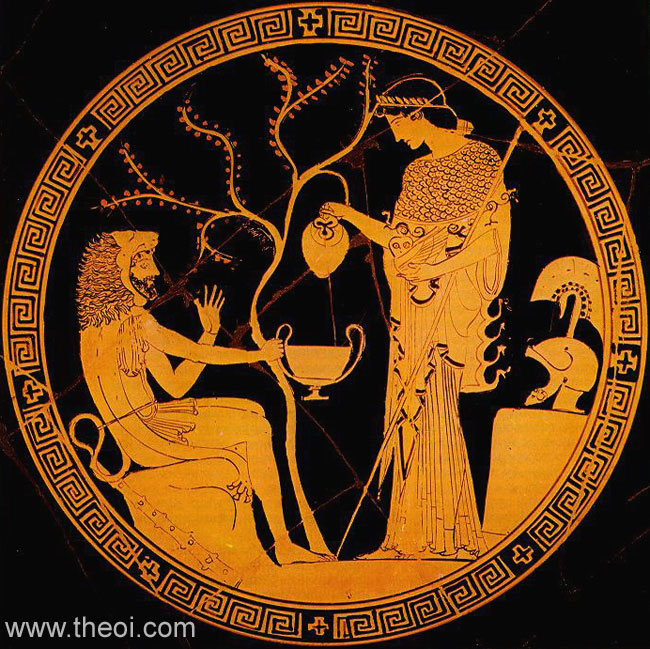
ATHENA was the Olympian goddess of wisdom, war, heroism and crafts.
This page contains tales of Athena's favour as the patron goddess of heroes. In old Greek epic she invariably stood beside each of the heroes of myth--for, as the Greeks said, a man was "nothing without the gods." However, with the loss of most of the old epic poems, her integral role in the stories is mostly preserved in ancient art.
(4) FAVOUR HEROIC ENDEAVOUR
AKHILLEUS (Achilles) A prince of Phthia in Malis (northern Greece) who was supported by Athena during the Trojan War.
ARGONAUTOI (Argonauts) The heroes of the Quest of the Golden Fleece were assisted by Athena in their voyage.
BELLEROPHON A prince and hero of Korinthos (southern Greece) who was assisted by Athena in his adventures: including the capture of the winged horse Pegasos and the slaying of the Khimaira.
DIOMEDES A prince and hero of Argos (southern Greece) who was supported by Athena in the Trojan and Epigoni Wars.
HERAKLES (Heracles) A prince and hero of Mykenai in Argolis (southern Greece) who was assisted by Athena during the completion of his twelve Labours and his later war campaigns. She also fetched him up to Olympos to join the gods from the pyre on Mount Oita.
KADMOS (Cadmus) A king of Thebes in Boiotia (central Greece) who was supported by Athena in the slaying of the drakon and the sowing of its teeth.
ODYSSEUS A king and hero of the island of Ithaka (central-west Greece) who was supported by Athena during the Trojan War and his subsequent return home to Ithaka.
PERSEUS A king and hero of Mykenai in Argolis (southern Greece) who was aided by Athena in his quest to slay the Gorgon Medousa.
THESEUS A prince and hero of Athens in Attika (southern Greece) who was assisted by Athena in his quest to slay the Minotauros of Krete.
TYDEUS A prince of Argos (southern Greece) who was Athena supported in the War of the Seven Against Thebes. She was even prepared to grant him immortality, until he tasted the brain of a slain opponent on the battlefield.
CLASSICAL LITERATURE QUOTES
ATHENA FAVOUR : PERSEUS
LOCALE : Various locations in Europe and Africa
I. QUEST FOR THE GORGON'S HEAD
Pseudo-Apollodorus, Bibliotheca 2. 37 - 41 (trans. Aldrich) (Greek mythographer C2nd
A.D.) :
"Polydeketes assigned him [Perseus] the task of fetching the Gorgon's head. So with Hermes and Athena as
his guides Perseus sought out the daughters of Phorkys [the Graia] . . . sisters of the Gorgones . . .
Perseus took flight and made his way to the ocean, where he found the Gorgones sleeping . . . All who looked at
them were turned to stone. Perseus, therefore, with Athena guiding his hand, kept his eyes on the reflection in
a bronze shield as he stood over the sleeping Gorgones, and when he saw the image of Medousa, he beheaded
her."
Pseudo-Apollodorus, Bibliotheca 2. 46 :
"Perseus [after returning to Seriphos and disposing of King Polydektes] . . . gave the sandals, kibisis and
helmet back to Hermes, and the Gorgon's head to Athena . . . Athena placed the Gorgon's head in the centre of
her shield."
Pausanias, Description of Greece 2. 21. 6 (trans. Jones) (Greek travelogue C2nd A.D.)
:
"[A wild Libyan woman] reached Lake Tritonis, and harried the neighbours until Perseus killed her; Athena
was supposed to have helped him in this exploit, because the people who live around Lake Tritonis are sacred to
her."
Ovid, Metamorphoses 5. 250 ff (trans. Melville) (Roman epic C1st B.C. to C1st A.D.)
:
"Tritonia [Athena] thus far had accompanied her gold-born brother [Perseus, in his quest]. Now [complete]
she left Seriphus wrapped all about in cloud."
II. ANDROMEDA & THE ETHIOPIANS
Ovid, Metamorphoses 4. 740 ff (trans. Melville) (Roman epic C1st B.C. to C1st A.D.)
:
"[After slaying the Sea-Monster] water was brought and Perseus washed his hands, triumphant hands . . .
Then he built three turf altars to three gods, the left to Mercurius [Hermes], the middle Jove's [Zeus'], the
right the warrior queen's [Athena's], and sacrificed a cow to Minerva [Athena], to the wing-foot god [Hermes] a
calf and to the king of heaven [Zeus] a bull."
Ovid, Metamorphoses 5. 46 ff :
"[When the Aithiopian prince Phineus and his allies tried to kill Perseus] Pallas [Athena] warrior goddess,
then appeared to guard her brother Perseus with her shield and give him heart."
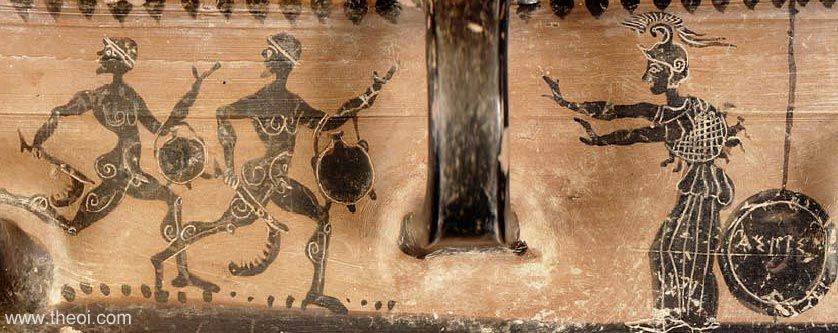
ATHENA FAVOUR : CADMUS
LOCALE : Thebes, Boiotia (in Central Greece)
Pseudo-Apollodorus, Bibliotheca 3. 4. 1-2 (trans. Aldrich) (Greek mythographer C2nd
A.D.) :
"The god [the Delphic oracle] told him [Kadmos] . . . to be guided by a cow, and to found a city wherever
she should fall down for weariness . . . And after traversing Boiotia, it sank down where is now the city of
Thebes. Wishing to sacrifice the cow to Athena, he sent some of his companions to draw water from the spring of
Ares. But a Drakon, which some said was the offspring of Ares, guarded the spring and destroyed most of those
that were sent. In his indignation Kadmos killed the dragon, and by the advice of Athena sowed its teeth. When
they were sown there rose from the ground armed men whom they called Spartoi. These slew each other, some in a
chance brawl, and some in ignorance . . . However, five of them survived [the ancestors of the Theban noble
houses]."
Ovid, Metamorphoses 3. 101 ff (trans. Melville) (Roman epic C1st B.C. to C1st A.D.)
:
"Gliding down out of the sky Pallas [Athena] appears and bids him [Kadmos] plough the soil and plant the
Serpent's teeth, from which a future people should arise. Cadmus obeys, and with his plough's deep share opens
wide furrows, then across the soil scatters the teeth [from which sprout the Spartoi]."
ATHENA FAVOUR : BELLEROPHON
LOCALE : Korinthos, the Isthmos (Southern Greece)
Pausanias, Description of Greece 2. 4. 1 (trans. Jones) (Greek travelogue C2nd A.D.)
:
"[In Korinthos] is the temple of Athena Khalinitis (Bridler). For Athena, they say, was the divinity who
gave most help to Bellerophontes, and she delivered to him Pegasos, having herself broken in and bridled
him."
ATHENA FAVOUR : HERACLES
LOCALE : Various (see below)
I. ARMS OF THE GODS
Pseudo-Apollodorus, Bibliotheca 2. 71 (trans. Aldrich) (Greek mythographer C2nd A.D.)
:
"Arms from the gods . . . Herakles [before setting out on his twelve labours] was given a sword from
Hermes, bow and arrows from Apollon, chest-armour of gold from Hephaistos, and a peplos from Athena."
Pseudo-Apollodorus, Bibliotheca 2. 69 :
"Erginos [King of Orkhomenos] brought an army against Thebes, but Herakles, who was placed in command [of
the Theban army] with weapons from Athena, slew Erginos, routed the Minyans."
II. LABOUR 1 : THE HYDRA
Hesiod, Theogony 306 ff (trans. Evelyn-White) (Greek epic C8th or 7th B.C.)
:
"The evil-minded Hydra of Lerna, whom . . . [Herakles] together with warlike Iolaos, destroyed with the
unpitying sword through the plans of Athene the spoil-driver."
Pausanias, Description of Greece 5. 17. 11 (trans. Jones) (Greek travelogue C2nd
A.D.) :
"[Depicted on the chest of Kypselos :] Herakles, with Athena standing beside him, is shooting at the Hydra,
the beast in the river Amymone."
Pseudo-Hyginus, Fabulae 30 (trans. Grant) (Roman mythographer C2nd A.D.) :
"Under Minerva's [Athena's] instructions he [Herakles] killed her [the Hydra], disembowelled her, and
dipped his arrows in her gall; and so whatever later he hit with his arrows did not escape death."
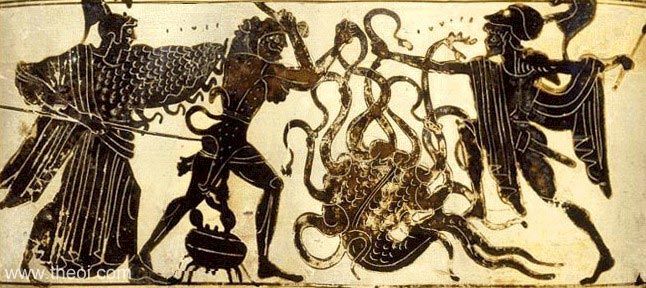
III. LABOUR 6 : STYMPHALIAN BIRDS
Pseudo-Apollodorus, Bibliotheca 2. 92 (trans. Aldrich) (Greek mythographer C2nd A.D.)
:
"For the sixth labour Herakles was ordered to drive off the Stymphalian birds . . . Herakles was stumped by
the problem of driving the birds out of the woods, but Athena got some bronze noise-makers from Hephaistos and
gave them to him, and by shaking these from a mountain adjacent to the lake he frightened the birds. Not
enduring the racket, they flew up in fear, and in this maner Herakles reached them with his arrows."
IV. LABOUR 11 : THE HESPERIDES
Pseudo-Apollodorus, Bibliotheca 2. 121 (trans. Aldrich) (Greek mythographer C2nd
A.D.) :
"Returning with the apples [of the Hesperides], he [Herakles] gave them to Eurystheus, who made a present
of them to Herakles. But Athena retrieved them from him and took them back, for it was not permitted by divine
law to locate them anywhere else."
V. LABOUR 12 : JOURNEY TO HAIDES
Pausanias, Description of Greece 8. 18. 3 (trans. Jones) (Greek travelogue C2nd A.D.)
:
"[In Homer] Athena says that Zeus does not remember that because of her he kept Herakles safe throughout
the labours imposed by Eurystheus : ‘For if I had known this in my shrewd heart when he sent him to Hades
the gate-keeper, to fetch out of Erebos the hound of hateful Hades, he would never have escaped the sheer
streams of' the river Styx.’"
Pausanias, Description of Greece 1. 15. 3 :
"[Depicted on the Painted Portico of Athens :] Theseus is represented as coming up from the underworld,
[with] Athena and Herakles."
VI. THE TROJAN SEA-MONSTER
Homer, Iliad 20. 145 ff (trans. Lattimore) (Greek epic C8th B.C.) :
"The stronghold of godlike Herakles, earth-piled on both sides, a high place, which the Trojans and Pallas
Athene had built him as a place to escape where he could get away from the Ketos (Sea Beast) when the charging
monster drove him away to the plain from the sea-shore."
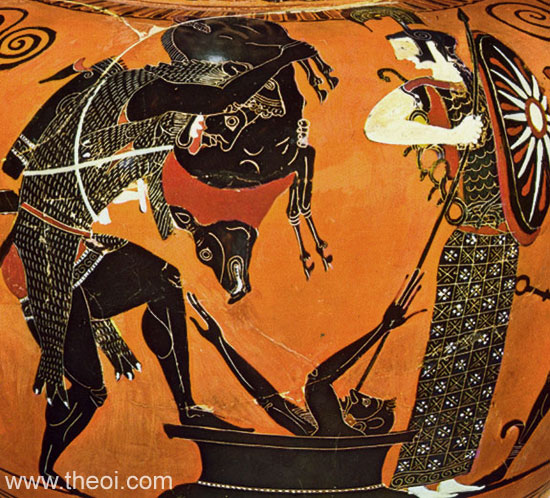
VII. ALKYONEUS & THE WAR OF THE GIANTS
Pseudo-Apollodorus, Bibliotheca 1. 35-37 (trans. Aldrich) (Greek mythographer C2nd
A.D.) :
"There was an oracle among the gods that they themselves would not be able to destroy any of the Gigantes,
but would finish them off only with the help of some mortal ally . . . With Athena's help he [Zeus] called for
Herakles to be his ally. Herakles first sent an arrow at Alkyoneus, who by falling to the earth recovered
somewhat. Athena advised Herakles to drag him outside of Pallene, which he did, and Alkyoneus thereupon
died."
Pseudo-Apollodorus, Bibliotheca 2. 138 :
"When Herakles had destroyed Kos [the island kingdom], he found his way with Athena's help to Phlegra where
he helped the gods reduce the Gigantes."
See also Athena & the War of the Giants
VIII. THE WAR OF PYLOS
Hesiod, Catalogues of Women Fragment 10 (from Scholiast on Apollonius Rhodius,
Argonautica 1.156) (trans. Evelyn-White) (Greek epic C8th or 7th B.C.) :
"Hesiod says that he [Periklymenos son of Neleus] changed himself in one of his wonted shapes and perched
on the yoke-boss of Herakles' horses, meaning to fight with the hero; but that Herakles, secretly instructed by
Athena, wounded him mortally with an arrow. And he says as follows : ‘. . . And he possessed all manner of
[shapechanging] gifts which cannot he told, and these then ensnared him through the devising of
Athene.’"
Pausanias, Description of Greece 6. 25. 2 (trans. Jones) (Greek travelogue C2nd A.D.)
:
"It is said that, when Herakles was leading an expedition against Pylos in Elis, Athena was one of his
allies. Now among those who came to fight on the side of the Pylians was Haides, who was the foe of Herakles but
was worshipped at Pylos."
IX. THE WAR OF SPARTA
Pseudo-Apollodorus, Bibliotheca 2. 144 (trans. Aldrich) (Greek mythographer C2nd
A.D.) :
"Herakles gathered an army against the Lakedaimonians . . . When he reached Arkadia he told Kepheus that he
would be honoured to have him and his twenty sons as allies, but Kepheus declined, for he feared to leave Tegea
lest the Argives march against it. Whereupon Herakles, who had received from Athena a lock of Gorgon's hair in a
bronze urn, gave it to Kepheus' daughter Sterope, with instructions to hold it up three time s from the walls in
the event of an invasion, and, if she didn't look in front of her, the enemy would reverse its direction. Since
that was so, Kepheus and his sons joined the expedition."
For the REST of this story see Athena Wrath: Auge
X. FIGHT FOR THE DELPHIC TRIPOD
Pausanias, Description of Greece 10. 13. 7 (trans. Jones) (Greek travelogue C2nd
A.D.) :
"[At Delphoi in Phokis there is a statue group of:] Herakles and Apollo are holding on to the tripod, and
are preparing to fight about it. Leto and Artemis are calming Apollon, and Athena is calming Herakles."
XI. HERAKLES & AKHELOOS
Pausanias, Description of Greece 6. 19. 12 :
"The Megarians who are neighbors of Attika built a treasury [at Olympia] and dedicated in it offerings,
small cedar-wood figures inlaid with gold, representing the fight of Heracles with Akheloos. The figures include
Zeus, Deianeira, Akheloos, Herakles, and Ares helping Akheloos. There once stood here an image of Athena, as
being an ally of Herakles."
XII. HERAKLES & KYKNOS
See The Shield of Heracles attributed to Hesiod
XIII. THE APOTHEOSIS OF HERAKLES
Pausanias, Description of Greece 3. 18. 11 (trans. Jones) (Greek travelogue C2nd
A.D.) :
"[Depicted on the throne of the Amyklaian at Amyklai in Lakedaimonia :] Athena is taking Herakles to dwell
henceforth with the gods."
Pausanias, Description of Greece 3. 19. 5 :
"Wrought on the altar [of the Amyklaian, at Amyklai in Lakedaimonia] is also Herakles; he too is being led
to heaven by Athena and the other gods."
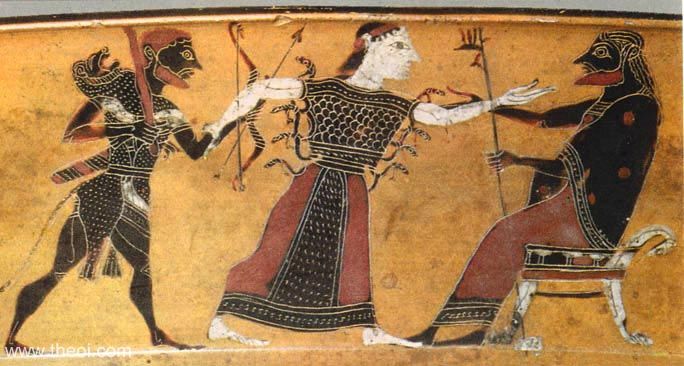
ATHENA FAVOUR : THESEUS
LOCALE : Various
Ovid, Metamorphoses 12. 359 ff (trans. Melville) (Roman epic C1st B.C. to C1st A.D.)
:
"Theseus' triumphs [in the battle of the Lapiths against the Centaurs] in the fight were too much for
[centaur] Demeleon. He tried with a huge heave to uproot an ancient pine, a sturdy trunk, and, when his efforts
failed, he snapped it off and threw it at his foe. But as the missile came Theseus drew back beyond its range,
on Pallas's [Athene's] advice (or so he'd have us think)."
ATHENA FAVOUR : TYDEUS
LOCALE : Thebes, Boiotia (Central Greece)
Pseudo-Apollodorus, Bibliotheca 3. 6. 8 (trans. Frazer) (Greek mythographer C2nd
A.D.) :
"[During the War of the Seven Against Thebes :] Melanippos, the remaining one of the sons of Astakos,
wounded Tydeus in the belly. As he lay half dead, Athena brought a medicine which she had begged of Zeus, and by
which she intended to make him immortal. But Amphiaraus hated Tydeus for thwarting him by persuading the Argives
to march to Thebes; so when he perceived the intention of the goddess he cut off the head of Melanippos and gave
it to Tydeus, who, wounded though he was, had killed him. And Tydeus split open the head and gulped up the
brains. But when Athena saw that, in disgust she grudged and withheld the intended benefit."
ATHENA FAVOUR : JASON & THE ARGONAUTS
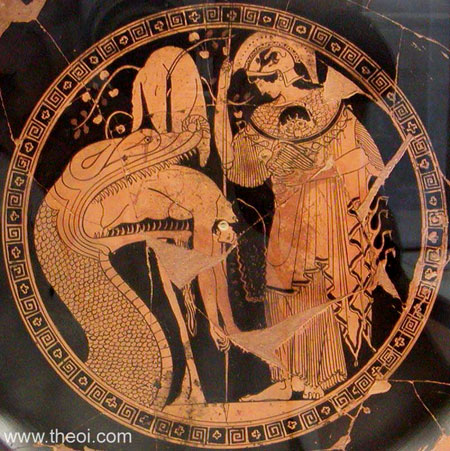
LOCALE : Iolkos, Thessalia (Northern Greece) & Kolkhis (On the Black Sea)
I. BUILDING OF THE SHIP ARGO
Pseudo-Apollodorus, Bibliotheca 1. 110 (trans. Aldrich) (Greek mythographer C2nd
A.D.) :
"Argos builds the Argo. As preparation for his expedition Iason (Jason) enlisted the help of Argos, the son
of Phrixos, who under the direction of Athena built a fifty-oared ship known ast he Argo after its builder. In
the prow Athena fitted a piece of the Dodonian oak that had the power of speech."
Pseudo-Hyginus, Fabulae 14 (trans. Grant) (Roman mythographer C2nd A.D.) :
"Argus, son of Danaus, was shipbuilder [of the Argo] . . . This is the ship Argo, which Minerva put in the
circle of stars because she built it. When first this ship was launched into the sea, it appeared among the
stars from rudder to sail. Cicero in his Phaenomena [a translation of Aratus] described its appearance and
beauty . . . This ship has four stars on her stern; on the right of the rudder, five; on the left, four--all
alike; in all, thirteen."
MORE INFO: Quotes from the Argonautica of Apollonius Rhodius and of Valerius Flaccus have yet to be compiled for this section.
ATHENA FAVOUR : DIOMEDES
LOCALE : Troy, Troad (Anatolia) & Greek Aegean
I. THE TROJAN WAR
See Athena and the Trojan War
II. THE RETURNS
Ovid, Metamorphoses 14. 467 ff (trans. Melville) (Roman epic C1st B.C. to C1st A.D.)
:
"Hero Narycius [Ajax] for a virgin's [Kassandra's] rape brought from the Virgin [Athena] on us all [the
Greeks] the lash that he alone deserved, we were dispesed. Raped by the winds across the hostile main, we Greeks
endured storms, lighning, darkness, wrath of sky and sea and, crowning tragedy, the cliffs of Caphereus . . .
But me [Diomedes] Minerva [Athena], warrior goddess, saved and rescued from the waves."
ATHENA FAVOUR : ODYSSEUS & TELEMACHUS
LOCALE : Ithaka (Western Greece) & various other locations
Cinaethon of Sparta or Eugammon of Cyrene, Telegony Fragment 1 (from Proclus,
Cherstomathia 2) (trans. Evelyn-White) (Greek epic C8th or 6th B.C.) :
"[Odysseus after his return to Ithaka :] goes to Thesprotis where he marries Kallidike, queen of the
Thesprotians. A war then breaks out between the Thesprotians, led by Odysseus, and the Brygoi. Ares routs the
army of Odysseus and Athena engages with Ares, until Apollon separates them."
MORE INFO: Quotes from Homer's Odyssey have yet to be compiled for this section.
ATHENA FAVOUR : AEETES
LOCALE : Kolkhis (on the Black Sea)
Pseudo-Apollodorus, Bibliotheca 1. 128 (trans. Aldrich) (Greek mythographer C2nd
A.D.) :
"Aeetes ordered him [Iason, Jason] to sow some Drakon-teeth which he had received from Athena: they were
half of the teeth which Kadmos had sown in Thebes."
ATHENA FAVOUR : PELEUS
LOCALE : Mount Pelion, Thessalia (Northern Greece)
Stasinus of Cyprus or Hegesias of Aegina, Cypria Fragment 5 (from Scholiast on
Homer's Iliad 17. 140) (trans. Evelyn-White) (Greek epic C7th or 6th B.C.) :
"At the marriage of Peleus and Thetis, the gods gathered together on Pelion to feast and brought Peleus
gifts. Kheiron gave him a stout ashen shaft which he had cut for a spear, and Athena, it is said, polished it,
and Hephaistos fitted it with a head. The story is given by the author of the Cypria."
Ptolemy Hephaestion, New History Book 6 (summary from Photius, Myriobiblon 190)
(trans. Pearse) (Greek mythographer C1st to C2nd A.D.) :
"Peleus, it is said, received on the occasion of his marriage [to Thetis] . . . from Athena a flute."
SOURCES
GREEK
- Homer, The Iliad - Greek Epic C8th B.C.
- Hesiod, Catalogues of Women Fragments - Greek Epic C8th - 7th B.C.
- Epic Cycle, The Cypria Fragments - Greek Epic C7th - 6th B.C.
- Epic Cycle, The Telegony Fragments - Greek Epic C8th - 6th B.C.
- Apollodorus, The Library - Greek Mythography C2nd A.D.
- Pausanias, Description of Greece - Greek Travelogue C2nd A.D.
- Ptolemy Hephaestion, New History - Greek Mythography C1st - 2nd A.D.
ROMAN
- Hyginus, Fabulae - Latin Mythography C2nd A.D.
- Ovid, Metamorphoses - Latin Epic C1st B.C. - C1st A.D.
BYZANTINE
- Photius, Myriobiblon - Byzantine Greek Scholar C9th A.D.
OTHER SOURCES
The quotes for this page are still being compiled.
BIBLIOGRAPHY
A complete bibliography of the translations quoted on this page.